Border Collie Teething FAQs [Everything Guide]
As a dog owner, you might be wondering about the teething process of your Border Collie puppy. Teething can be a challenging phase for both the dog and the owner, and being prepared with accurate information can make a big difference in how you handle this period.
In this article, we will discuss Border Collie teething and provide answers to some common questions that you may have about this important developmental stage.
Border Collies are known for their intelligence and agility, but like all puppies, they go through a teething phase that is essential for their growth and development. During this time, you will notice your puppy’s behavior changes, such as increased chewing and possible discomfort. This phase typically begins around 3 to 4 months of age and usually lasts until the puppy is about 7-8 months old.
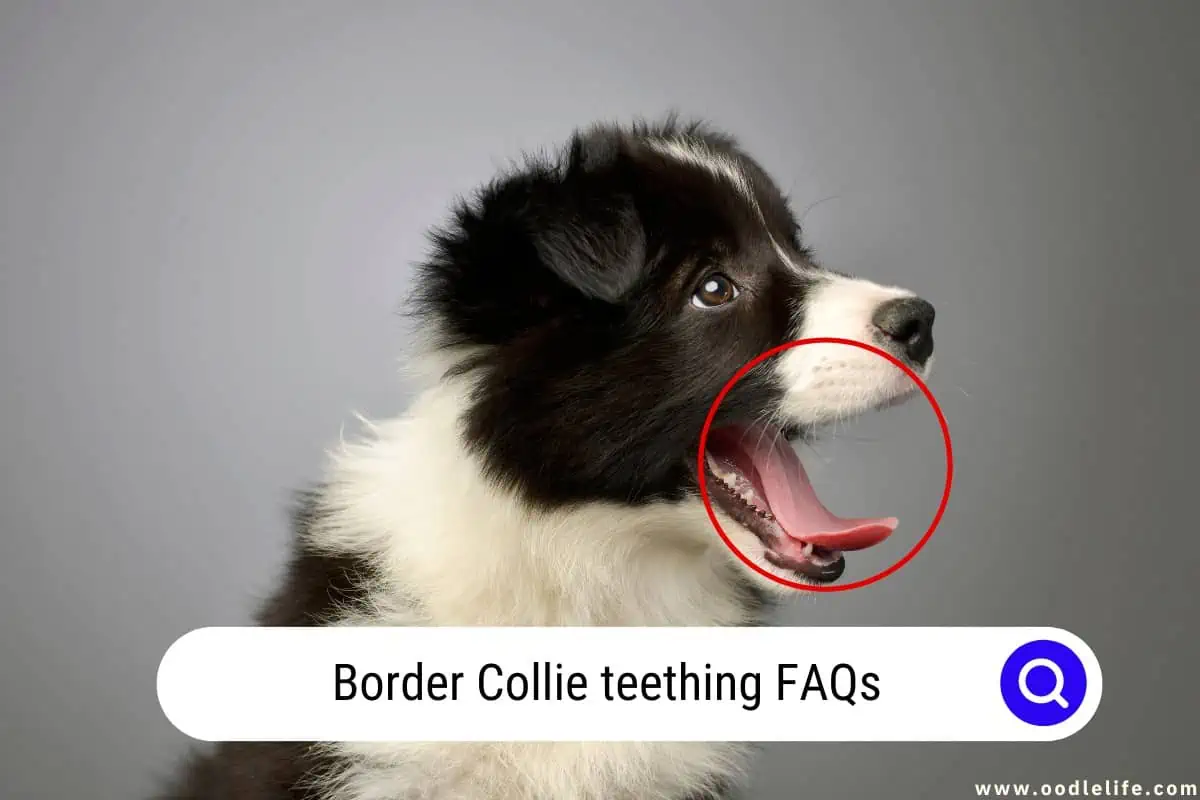
To help your Border Collie puppy through teething, you may provide suitable chew toys and make sure to monitor their progress. Understanding the signs, symptoms, and timeline of teething in Border Collies will not only help you provide proper care and support but also build a strong bond with your furry companion during this crucial period. So, buckle up and get ready to dive into the world of Border Collie teething FAQs!
Border Collie Teething Timeline
The Teething Process
Border Collie puppies, like all dogs, go through a teething process where they lose their baby teeth and grow adult teeth. This process starts at around 3 to 4 weeks of age when the puppy teeth begin to emerge. By the time they are 6 to 8 weeks old, they will have all 28 of their baby teeth.

During this time, you may notice your Border Collie puppy is more inclined to chew on toys or other objects. This is because chewing helps soothe the discomfort of teething. Providing them with safe and appropriate chew toys can help alleviate their discomfort and protect your belongings from being damaged.
Two crucial stages of teething in Border Collies are:
- 3-4 weeks old: Baby teeth start to emerge.
- 6-8 weeks old: All 28 baby teeth have emerged.
Teeth Replacement
Border Collies, like other dog breeds, will eventually lose their baby teeth and replace them with adult teeth. The teething process continues as they grow, and around 4 to 6 months of age, their baby teeth will start to fall out to make room for the adult teeth.
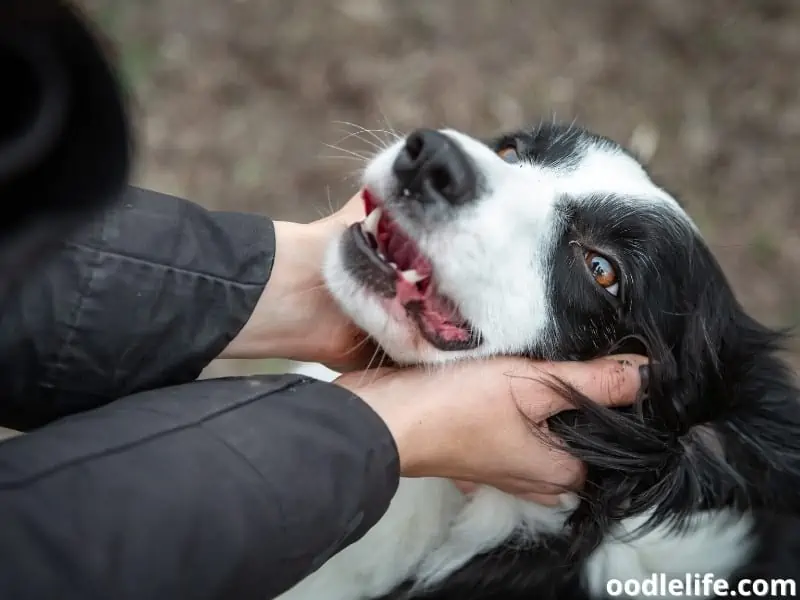
During this teeth replacement stage, it’s essential to monitor your Border Collie for any potential issues, such as retained baby teeth. If a baby tooth is not falling out even as the adult tooth is growing in, consult your veterinarian, as this may cause problems like misaligned teeth or gum infections.
Border Collies will have 42 adult teeth in total. The process of adult teeth emerging and replacing baby teeth is usually completed by the time they are around 7 to 8 months old. However, this timeline may vary slightly for individual dogs.
In summary, the phases of teeth replacement are:
- 4-6 months old: Baby teeth start to fall out.
- 7-8 months old: Adult teeth have fully replaced baby teeth (total of 42 adult teeth).
Signs of Teething
Border Collie puppies typically begin teething between 3 to 6 months of age. As a responsible owner, it’s essential to be aware of the signs of teething, so you can help your pup navigate this potentially uncomfortable period. In this section, we will discuss the behavior changes and physical indicators that your Border Collie may exhibit while teething.
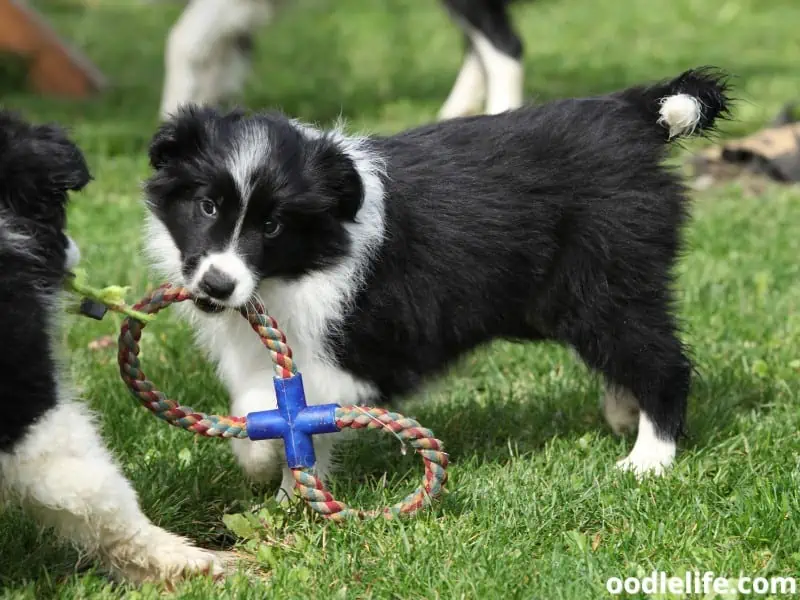
Behavior Changes
While teething, your Border Collie puppy may exhibit some changes in behavior due to the discomfort and pain they’re experiencing. Some common behavior changes include:
- Chewing on objects: Puppies may seek relief from the discomfort by chewing on various items around the house. Make sure to provide them with safe and appropriate chew toys to protect both your belongings and their teeth.
- Increased drooling: You may notice your puppy drooling more than usual. This is a normal response to the teething process and should subside once their adult teeth have fully emerged.
- Irritability and restlessness: Teething can cause your pup some pain, leading to them being irritable or restless. Be patient and understanding during this time.
Physical Indicators
In addition to behavior changes, there are some physical signs that can help you identify if your Border Collie is teething. These include:
- Red and swollen gums: As the new teeth push through the gums, you may notice redness and swelling around the area. This is a normal part of the teething process.
- Bleeding: Some minor bleeding might occur when the puppy loses a baby tooth or as the adult teeth emerge. If the bleeding is excessive or doesn’t subside, consult your veterinarian.
- Visible teeth emerging: As your puppy’s adult teeth start to grow in, you’ll be able to see them pushing through the gums.
Remember to be patient and understanding with your Border Collie puppy as they navigate the teething process. While it might be a little messy and sometimes frustrating, this phase doesn’t last forever. Before you know it, your pup will have a full set of shiny adult teeth, ready to show off in their adorable doggy grin!
Soothing Your Teething Border Collie
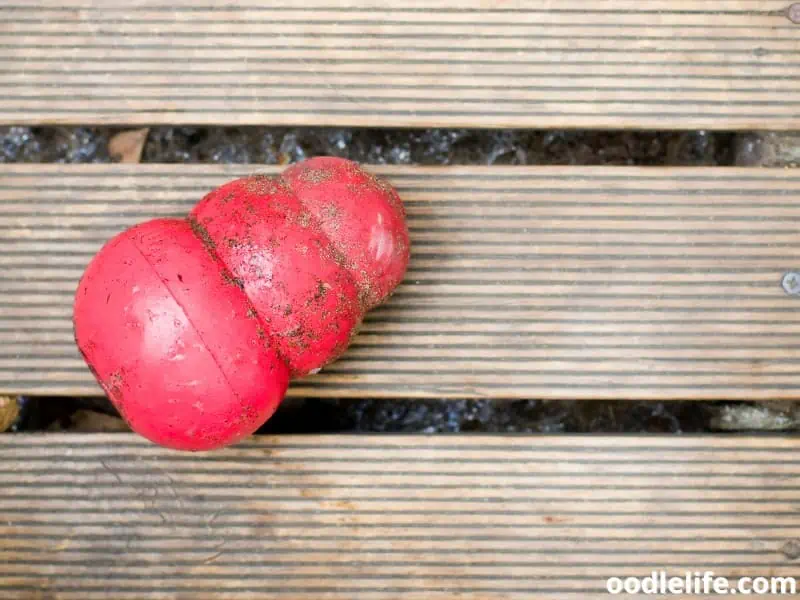
Toys Selection
Choose the right toys for your teething Border Collie, focusing on toys that resist their strong chewing urges without breaking apart. Chew toys such as Kongs and Nylabones are great options, and they should be sturdy enough to withstand their biting power. You can also add some soft toys to the mix, ensuring they have different textures to explore.
Chewing Alternatives
Offer your teething Border Collie some alternative chewing options to divert their attention from off-limits items. You can do this by using natural options such as raw bones or antlers. Ensure the bone is an appropriate size for your pup and monitor them while they chew to avoid choking hazards.
Don’t forget to consider their breed characteristics, as an active Border Collie can benefit from engaging puzzle toys that stimulate their minds while they chew.
Teething Aids
To help soothe your teething pup, you can invest in some cooling teething aids. For instance, try freezing a damp cloth or a puppy-safe ice pack for them to gnaw on. The cold helps numb their gums and offers relief. In addition, you can stuff their Kongs with frozen treats, making the toy even more appealing and further relieving discomfort.
Remember, consistency is essential when soothing your teething Border Collie. Provide them with a variety of safe, engaging toys and chewing alternatives, while also offering teething aids to alleviate discomfort. Your pup will be grateful, and your belongings will thank you, too!
Preventing Biting and Damage
Biting Deterrence
Border Collie puppies go through a teething phase which can lead to biting. To deter biting, you can use various techniques. First, try giving them appropriate chew toys to help soothe their gums and save your furniture from becoming a chewing target.

Consistently redirect the puppy’s bites from your hands or other inappropriate objects to the toys. Remember that during this phase, your tone and reactions matter. Whenever your puppy bites too hard, react with a loud yelp followed by ignoring the puppy briefly – this simulates how their littermates would respond and helps them learn bite inhibition.
Training is crucial in these early stages to prevent bad habits like nipping and relentless biting. Teach basic commands like “sit,” “stay,” and “leave it” to help establish boundaries and assert your position as the leader. Engaging in regular play – both physical and mental – will ensure that your Collie uses its energy productively, reducing the likelihood of biting as an outlet for pent-up enthusiasm.
Protecting Your Home
Border Collie puppies can be quite adventurous, and your home may be at risk of damage during the teething phase.

To protect your belongings, follow some preventive measures:
- Cover furniture edges: Use thick covers on the edges of sofas, chairs, and tables to prevent the puppy from chewing on them.
- Maintain cleanliness: A clean home with fewer tempting items lying around will reduce the chances of damage. Keep shoes, clothes, and other enticing objects out of your puppy’s reach.
- Use deterrent sprays: Apply safe, bitter-tasting sprays on objects you don’t want your puppy to chew. The unpleasant taste will discourage them from biting the sprayed items.
By using these tips, you can ensure that your Border Collie puppy grows up with healthy chewing habits, while minimizing the damage to your home. And remember, during these challenging early months, consistency and patience are key. So, take a deep breath, grab some chew toys, and get ready for the rewarding journey of raising a happy and well-behaved dog!
Basic Dental Care
Taking care of a Border Collie’s teeth during the teething phase is important for their overall oral health. Below are a couple of sub-sections discussing cleaning techniques and choosing the right products for your puppy’s dental care.
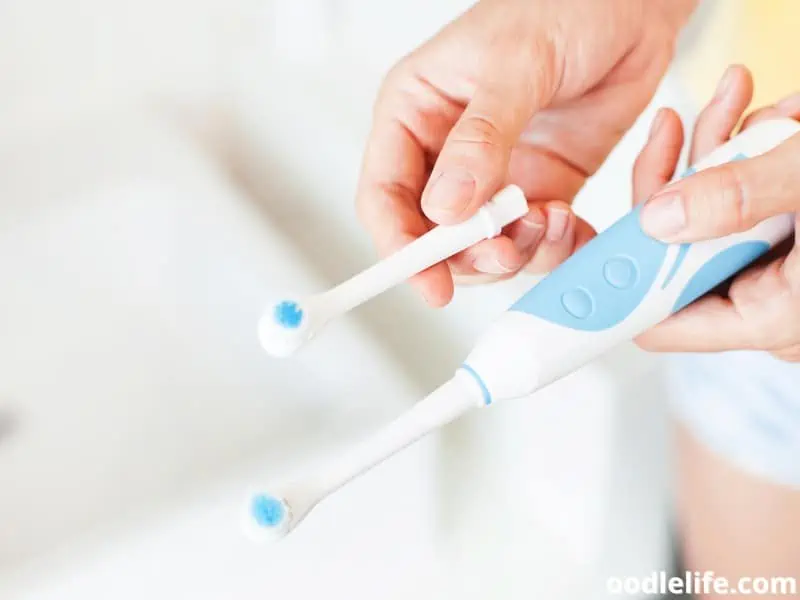
Cleaning Techniques
Regular brushing is essential to maintain your Border Collie’s oral health. Start by introducing the brushing process slowly, allowing your puppy to get acquainted with the toothbrush and toothpaste. Make sure to use a gentle, circular motion to brush their teeth, paying special attention to the gumline.
Here are some brushing tips for your Border Collie:
- Brush their teeth at least two or three times a week.
- Choose a quiet time and location to make the process less stressful.
- Make sure to praise and reward them after each brushing session, creating a positive association.
Choosing the Right Products
Using canine-specific toothpaste and toothbrushes is crucial for your Border Collie’s dental care. Human toothpaste can be harmful to dogs, as it may contain ingredients like fluoride and xylitol that are toxic to them.
Here’s a list of recommended products for your dog’s dental care:
- Toothbrush: Use a soft-bristled toothbrush designed for dogs, or a finger brush for easier access to your dog’s teeth.
- Toothpaste: Opt for a canine toothpaste, which usually comes in flavors like poultry or peanut butter to make the brushing process more enjoyable for your pet.
- Dental chews or toys: Provide your teething Border Collie with dental chews or toys designed to clean their teeth and soothe their gums.
Remember to consult your vet before introducing any new dental care products to your Border Collie. Regular check-ups with the vet will also help ensure your puppy’s teeth are in top shape. With proper care and attention, your furry friend’s oral health will be something worth smiling about!
Common Dental Problems
Border Collies, like any other breed, are susceptible to various dental problems. Some of the most common issues include plaque buildup, bad breath, gum disease, tooth decay, and periodontal disease. It is essential to maintain your dog’s dental health to prevent these problems and ensure a happy and healthy life.

One major concern for Border Collies is plaque and tartar accumulation, which can lead to bad breath. You can minimize this by providing your dog with dental chews, such as bully sticks. These chews help to scrape away plaque and tartar while your dog enjoys a tasty treat.
You can also use peanut butter as a tooth-friendly treat – just make sure it’s sugar-free and doesn’t contain xylitol.
Another essential component in maintaining good dental health for your Border Collie is regular brushing. Use a canine toothpaste, as human toothpaste may contain ingredients that are harmful to dogs. Additionally, never skip on routine visits to your veterinarian, as they can help detect early signs of dental problems such as gingivitis or tooth loss.
Diet plays a crucial role in maintaining your Border Collie’s dental health. A balanced diet with appropriate nutrients can help keep your dog’s teeth strong and healthy. Avoid feeding them excessive table scraps, as these may contribute to plaque buildup.
Teething is a natural process for all dog breeds, including Border Collies. As their deciduous teeth (baby teeth) fall out, permanent teeth – incisors, canines, premolars, and molars – will emerge. During this time, you may notice your dog chewing more than usual to alleviate discomfort.
Remember that it’s essential to monitor your Border Collie’s dental health and address any issues promptly. Early intervention can make a significant difference in preventing more severe problems such as tooth decay, gum disease, or tooth loss.
Exercise and Training
Border Collies are a highly energetic and intelligent breed that thrives on mental and physical stimulation. When it comes to teething, these dogs can benefit from exercise and training as well.

During the teething phase, puppies experience discomfort and often find relief by chewing on toys or objects. Incorporate toys into your Border Collie’s exercise regimen to help keep their minds off the discomfort. Fetch, for example, is a fun way to engage them both physically and mentally.
Training sessions can be tailored to suit your Border Collie’s needs. Since they’re a breed known for their agility and herding instincts, consider teaching them commands like “sit,” “stay,” and “heel,” which can help channel their energy and keep their minds sharp.
It’s important to note that a well-exercised and mentally stimulated Border Collie is less likely to exhibit destructive behavior during the teething phase. As the saying goes, “a tired dog is a happy dog.”
Make sure your Border Collie gets enough exercise without overdoing it; puppies can tire quickly. A walk, a game of Frisbee, or short training sessions are excellent ways to keep your pup moving and help them maintain both physical and mental health.
Remember, as a confident and knowledgeable owner, it’s crucial to be consistent, patient, and clear in your training and exercise routines. A well-trained, healthy, and happy Border Collie will bring joy to your family for years to come.
Border Collie Overview
Border Collies are known for their striking coats, which come in a variety of colors and patterns. The most common hues are black and white, but they can also be found with blue or merle coats. Regardless of the color, their coats are typically weather-resistant and medium length, requiring regular grooming to keep them looking their best.

When it comes to temperament, Border Collies are often described as energetic and intelligent. In fact, they are commonly considered one of the smartest dog breeds. With their strong intuition and problem-solving skills, they excel in various activities such as herding, agility, and obedience training.
It’s no wonder they’re often featured in dog sports competitions and on working farms.
However, Border Collies’ high intelligence and energy levels mean they need constant mental and physical stimulation. A simple stroll around the block won’t suffice for this active breed; they thrive on engaging activities and challenging games. Providing ample exercise and mental challenges can help keep your Border Collie happy and well-behaved.
Unfortunately, with their intelligence and energy comes the potential for certain health problems. As with any breed, it’s essential to be aware of common health conditions in Border Collies and take preventative measures. Some health issues to be aware of include hip dysplasia, progressive retinal atrophy, and deafness, particularly in merle-coated individuals.
Regular vet check-ups and a healthy lifestyle can go a long way in ensuring your Border Collie lives a long, happy life.
In summary, Border Collies are a remarkable breed known for their intelligence, striking coats, and energetic temperament. With proper care, exercise, and mental stimulation, these dogs can bring joy and companionship to any household. Just be prepared for plenty of action and a little bit of fur!
Conclusion
One thing is for sure: teething can be a challenging period for Border Collie owners. To help them get through this phase without too much damage to personal belongings or their puppy’s well-being, it’s essential to be prepared and knowledgeable about the teething process.
Managing a teething Border Collie requires patience and understanding. Providing appropriate chew toys, as mentioned in Katz on dogs: A commonsense guide to training and living with dogs, can help redirect the puppy’s natural urge to chew on items not meant for them
Although teething can be a pain (literally), remember that it’s a temporary phase. Soon enough, your furry little companion will have a full set of adult teeth and, much to your relief, that insatiable need to chew will significantly decrease.
While you can’t speed up the teething process, having a solid foundation of knowledge backed by tips from experts like those found in the book How to Listen to Your Dog: The Complete Guide to Communicating with Man’s Best Friend can make this period more manageable.
So, here’s to conquering the challenges of Border Collie teething with confidence, knowledge, and a touch of humor, to make the journey just a bit more enjoyable for both you and your canine companion. Remember, in the words of a wise, albeit non-teething, Collie: “This too shall pass.”